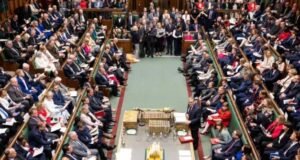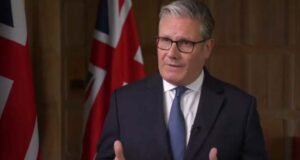
In a landmark event, millions of voters across the United Kingdom are casting their ballots in the general election today. Polls opened at 07:00 BST and will remain open until 22:00 BST, giving citizens ample time to participate in this pivotal democratic process.
This election marks a significant change as it is the first general election where voters are required to bring photo identification to vote in person. This new measure aims to enhance the integrity of the voting process and ensure that every vote cast is legitimate. Additionally, this is the first general election held in July since 1945, adding a unique historical context to today’s proceedings.
With around 46 million eligible voters, the electorate is tasked with electing 650 Members of Parliament (MPs). For any party to form a majority government, they need to secure at least 326 seats. The stakes are high, and the outcome will shape the political landscape of the UK for the coming years.
To assist voters in navigating this crucial day, various resources are available to find out who is standing for election in their area and to locate their nearest polling station. These resources aim to make the voting process as accessible and straightforward as possible.
As the day progresses, the nation watches with bated breath, waiting to see how the results will unfold and which party will emerge victorious in this significant election.
Contesting Major Parties
In the 2024 UK general election, several political parties are contesting for seats in the House of Commons. The major parties, along with some smaller parties and independents, are fielding candidates across the country’s 650 constituencies. Here are the main parties contesting the election:
Conservative Party
• Traditionally center-right, advocating for free-market policies, a strong national defense, and Brexit
• Led by Rishi Sunak (as of 2024).
Labour Party
• Center-left, focusing on social justice, workers’ rights, and public services
• Led by Keir Starmer (as of 2024)
Liberal Democrats
• Center to center-left, promoting civil liberties, social liberalism, and pro-European Union policies
• Led by Ed Davey (as of 2024).
Scottish National Party (SNP)
• Advocates for Scottish independence and progressive policies
• Led by Humza Yousaf (as of 2024).
Green Party
• Focuses on environmental issues, social justice, and grassroots democracy
• Co-led by Carla Denyer and Adrian Ramsay (as of 2024)
Plaid Cymru
• Welsh nationalist party advocating for Welsh independence and progressive policies
• Led by Rhun ap Iorwerth (as of 2024)
Other Notable Parties
Brexit Party (now rebranded as Reform UK)
• Focuses on reforming the political system and Brexit-related policies
• Led by Richard Tice (as of 2024)
UK Independence Party (UKIP)
• Right-wing, focusing on Brexit and immigration control
• Led by Neil Hamilton (as of 2024)
Democratic Unionist Party (DUP)
• Unionist and socially conservative party in Northern Ireland
• Led by Jeffrey Donaldson (as of 2024)
Sinn Féin
• Irish republican party advocating for Irish reunification
• Led by Mary Lou McDonald (as of 2024)
Social Democratic and Labour Party (SDLP)
• Centre-left, advocates for Irish nationalism and social democracy
• Led by Colum Eastwood (as of 2024)
Alliance Party of Northern Ireland
• Centrist party advocating for liberal and progressive policies
• Led by Naomi Long (as of 2024)
Independent Candidates and Smaller Parties
Various independent candidates and smaller parties are also contesting in different constituencies, representing a wide range of local and specific interests.
These parties are vying for the 650 seats in the House of Commons, and the outcome will determine the formation of the next UK government. Each party’s campaign focuses on key issues such as the economy, healthcare, education, and climate change, reflecting their respective political ideologies and visions for the country’s future.
Voting Process
Polling Stations: Voters cast their ballots at designated polling stations, which are often located in schools, community centers, or other public buildings.
Postal Voting: Available for those unable to vote in person.
Proxy Voting: Voters can appoint someone else to vote on their behalf if they are unable to vote in person.
Election Night and Results
Counting: Once polls close, ballot boxes are transported to counting centers where votes are tallied.
Results: Results are usually declared in the early hours of the following day. The party with the majority of seats in the House of Commons typically forms the government.
Government Formation
Majority Government: A party needs at least 326 seats to form a majority government.
Coalition or Minority Government: If no party secures a majority, a coalition or minority government may be formed.
Recent Trends
Turnout: Voter turnout can vary, influenced by the political climate and key issues at stake.
Photo ID Requirement: Starting with the latest election, voters are required to present photo ID at polling stations, a new measure aimed at reducing electoral fraud.
The UK general elections are a cornerstone of the country’s democratic process, reflecting the will of the electorate and shaping the nation’s governance.
Source: With inputs from agencies
 Weekly Bangla Mirror | Bangla Mirror, Bangladeshi news in UK, bangla mirror news
Weekly Bangla Mirror | Bangla Mirror, Bangladeshi news in UK, bangla mirror news







